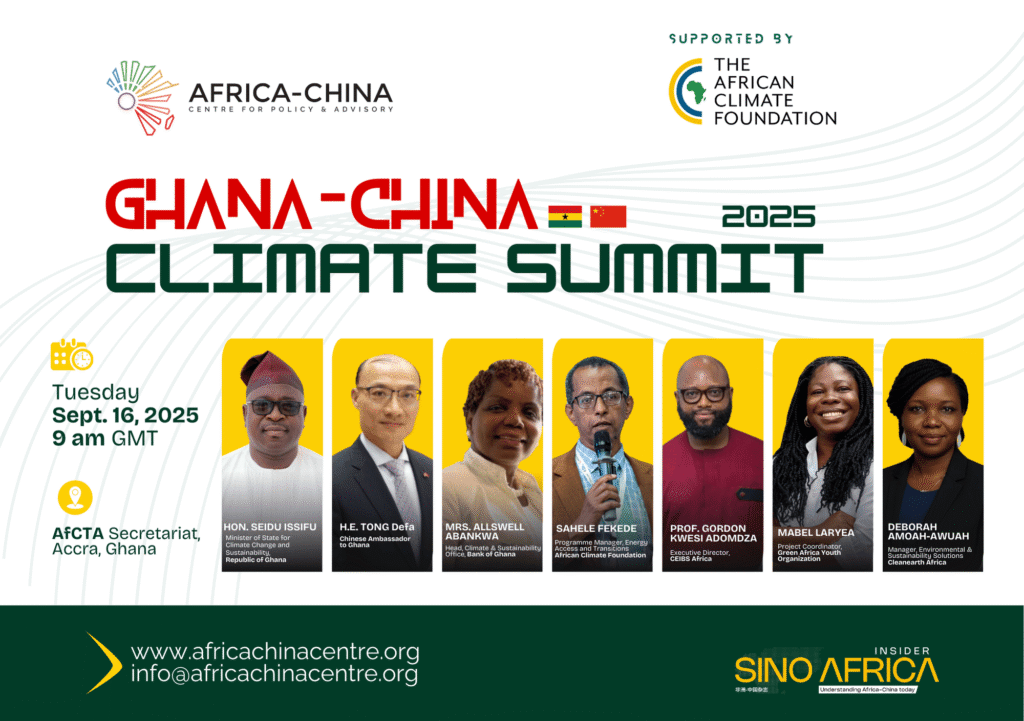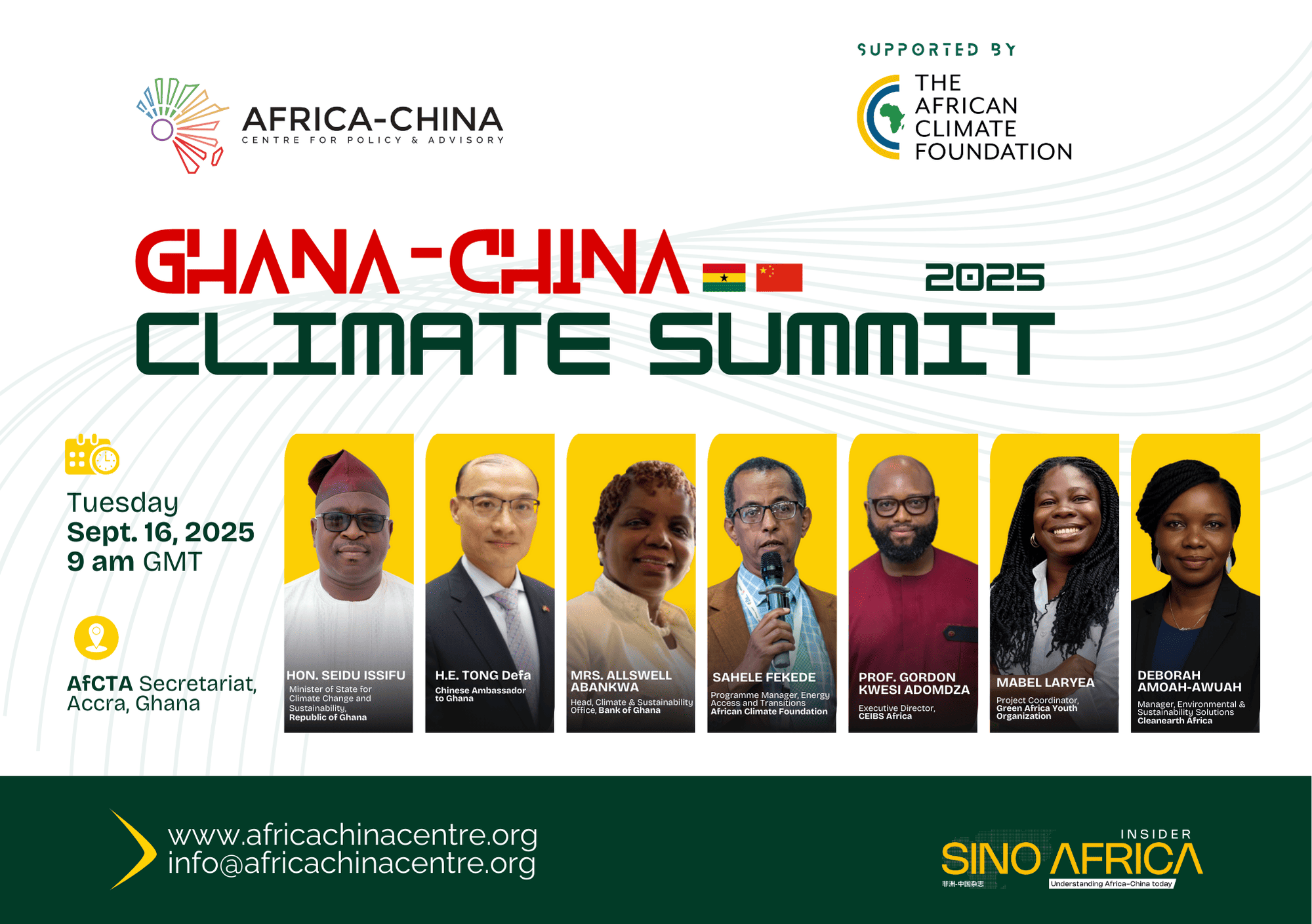Climate change has emerged as one of the most pressing development challenges of our time, threatening economies, livelihoods, and ecosystems worldwide. For Africa — and Ghana in particular — the impacts are acute: extreme weather events, declining agricultural productivity, and rising energy demands are undermining growth and sustainable development. Against this backdrop, Ghana’s commitment to building a climate-resilient, low-carbon economy requires not only domestic innovation but also international cooperation.
One of Ghana’s most strategic partners in this endeavor is the People’s Republic of China. Through the Forum on China–Africa Cooperation (FOCAC), China has committed to advancing Africa’s green transition as a cornerstone of its partnership with the continent. As Ghana gets ready to host the Ghana–China Climate Summit 2025 in Accra, it is an ideal moment to turn commitments into practical cooperation.
FOCAC 2024 Beijing Action Plan – A Green Turning Point
The 2024 FOCAC Summit in Beijing reaffirmed China’s commitment to Africa’s sustainable development, with green development and climate action elevated as priority pillars. The Beijing Action Plan outlined commitments in:
- Renewable energy and energy efficiency – expanding access to affordable, clean energy in Africa.
- Green finance – mobilizing capital for sustainable infrastructure and industrial transformation.
- Technology and knowledge transfer – sharing innovations in agriculture, industry, and energy.
- Nature-based solutions – supporting conservation, afforestation, and biodiversity protection.
For Ghana, which has set ambitious goals in its Nationally Determined Contributions (NDCs) and Energy Transition Framework, these FOCAC commitments align directly with national priorities. They provide a framework for building climate resilience while also tapping into economic opportunities in the green economy.
Ghana–China Climate Cooperation: Building Synergies
Already, Ghana–China cooperation is visible in areas such as renewable energy, infrastructure, and trade. The next phase must deliberately embed climate considerations into these engagements. Potential areas of cooperation include:
- Renewable Energy & Green Infrastructure
Ghana’s vast solar and hydro potential can be unlocked with Chinese investment and technology. Collaboration could extend to green transport solutions, energy-efficient housing, and eco-industrial parks. - Climate Finance
Ghana faces a significant climate financing gap. Through FOCAC and bilateral channels, China could play a pivotal role in mobilizing concessional loans, blended finance, and private investments to scale climate-friendly projects. - Technology & Knowledge Transfer
From climate-smart agriculture to waste-to-energy solutions, China’s expertise can help Ghana adapt tested technologies to local needs. This strengthens Ghana’s industrial base while promoting sustainability. - Nature-Based Solutions
Cooperation on afforestation and biodiversity aligns with Ghana’s “Green Ghana” initiative and complements China’s strong track record in large-scale reforestation. Joint projects could enhance carbon sequestration and rural livelihoods.
The Strategic Importance of the 2025 Summit

The Ghana–China Climate Summit 2025 in Accra represents a landmark opportunity to give structure and visibility to these ambitions. Beyond high-level dialogue, the summit could deliver a tangible milestone on Climate Cooperation and Green Development between the Governments of Ghana and China through the following:
- Institutionalize Cooperation: Establishing a framework for dialogue, technical exchange, and joint initiatives.
- Signal Political Commitment: Demonstrating leadership from both sides on climate action.
- Unlock Future Opportunities: Strengthening Ghana’s position to mobilize support under future FOCAC pledges and other global climate finance mechanisms.
- Elevate Ghana’s Role: Positioning Ghana as a frontrunner in Africa–China climate cooperation and as a model for other African states.
It is encouraging that in recent engagements, the Chinese side has expressed readiness to welcome such an initiative. A proactive step by Ghana to formalize this intent would not only cement bilateral ties but also give the Minister of State for Climate Change and Sustainability a defining legacy in Ghana’s climate diplomacy.
Why This Matters for Ghana
The benefits of Ghana–China climate cooperation extend beyond diplomacy. They touch directly on Ghana’s development agenda:
- Policy Alignment: Strengthens Ghana’s ability to implement its NDCs and Energy Transition Framework.
- Economic Opportunity: Green investments create jobs, boost manufacturing, and attract new industries.
- Global Visibility: Elevates Ghana as a credible actor in international climate negotiations and as a bridge between Africa and China.
- Continental Relevance: Demonstrates how African states can leverage bilateral partnerships to advance climate action, setting an example under the African Continental Free Trade Area (AfCFTA).
Conclusion: A Shared Responsibility
Climate change is a global challenge that requires shared solutions. Ghana and China, through their partnership, have the chance to show that climate cooperation can be mutually beneficial — advancing Ghana’s resilience and development, while reinforcing China’s role as a global partner for sustainability.
The upcoming Ghana–China Climate Summit 2025 is more than an event; it is a strategic opportunity to set the tone for a new era of climate diplomacy between Accra and Beijing. By seizing this moment — and formalizing cooperation— Ghana can secure both immediate and long-term gains for its people, its economy, and its environment.
As we look forward from Beijing 2024 to Accra 2025, the message is clear: the time to act on Ghana–China climate cooperation is now.





